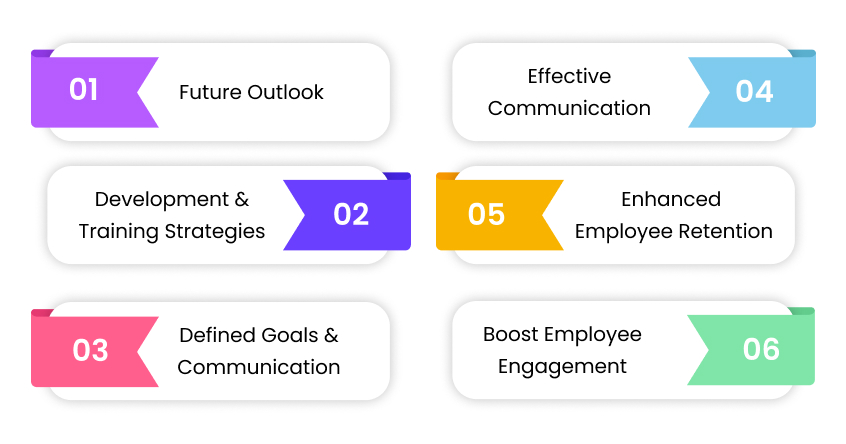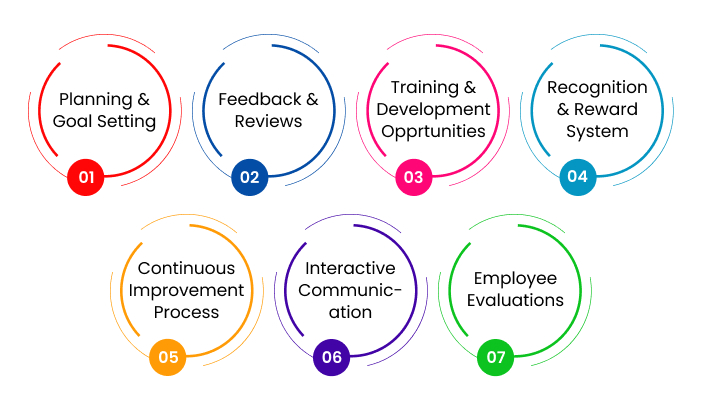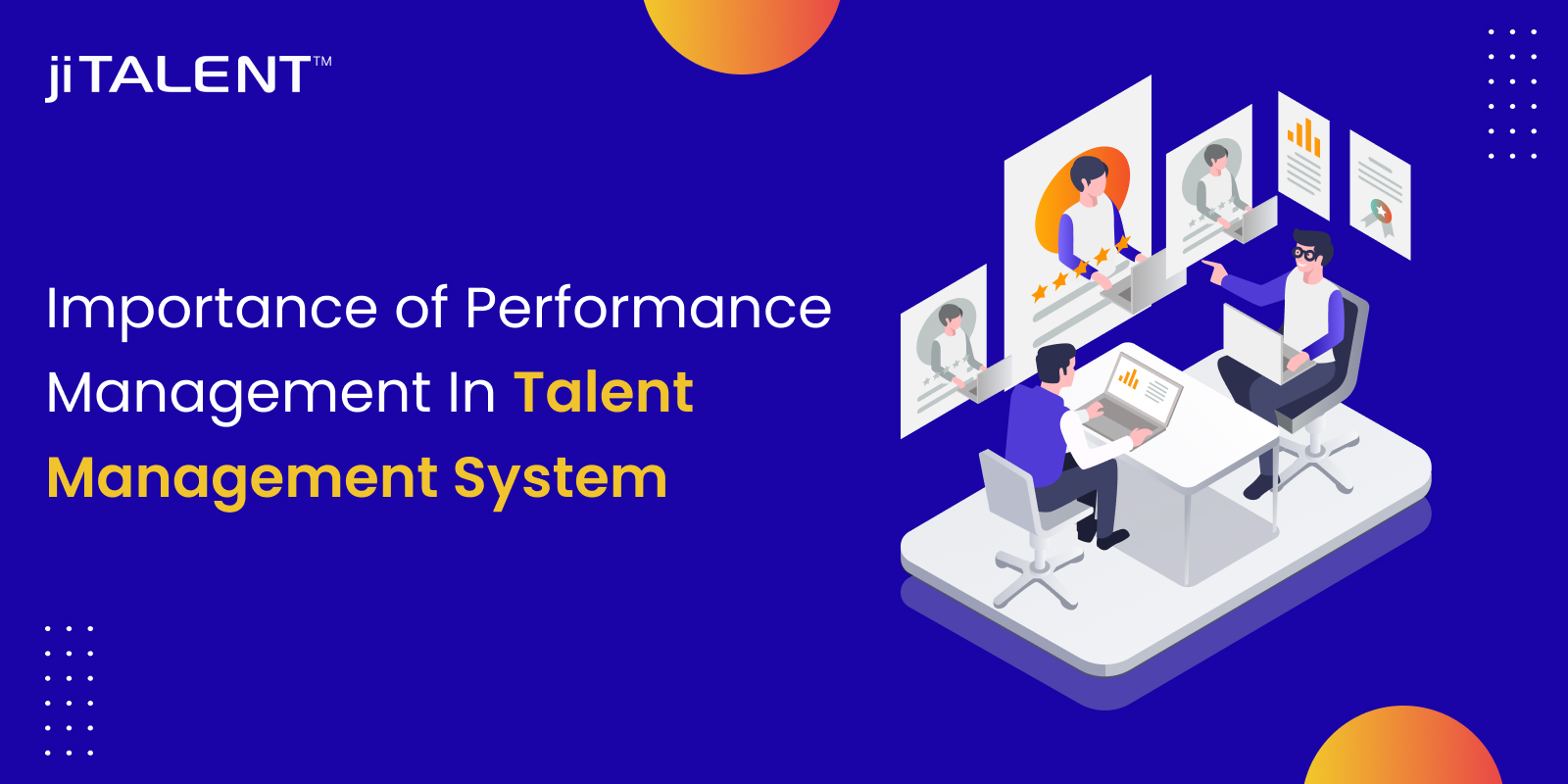Today, businesses are scaling fast, becoming diverse and agile, and measuring success in numerous ways. With the continuous evolution of technologies, roles, and expectations are changing at a faster rate. The world is becoming more digital, changing the employee-employer relationship. It is great to track the activities at a macro scale, but paying attention to detail for every employee is vital.
According to Gartner, 82% of employees say that they want their efforts to be seen by their organization. So, to maintain a meaningful employee-employer relationship, businesses can consider having a seamless performance management process.
Performance management is an integral part of the Talent Management System. It is a process of setting goals for individuals and teams. It regularly monitors progress toward business goals, provides feedback, and recognizes employees and their efforts. It helps organizations confirm that the employees work effectively and efficiently toward achieving common organizational objectives.
What is the importance of Performance Management?
Seamless performance management is not only about promotions, evaluations, and appraisals. A great performance management system helps businesses maintain a robust talent management system. As time passes, businesses are recognizing the importance of Performance Management. Let us discuss the importance of the Performance Management System.

Future Outlook: Effective performance management empowers employees by providing them with clarity regarding their responsibilities and expectations. With well-defined goals and targets, team members can focus their efforts effectively. It results in improved collaboration and alignment with their employees. This vision creates peace and motivation within the workplace, leading to less tension and greater consistency in task completion. Moreover, constant monitoring helps businesses understand the potential of an employee. And highlights the areas where they need to focus or where improvement is required.
Development and Training Strategies: As discussed above, knowing what is crucial for an organization helps them take the necessary steps that help them grow. Sometimes, employees do not perform as per expectations. It is because they do not have the required skills. Efficient performance management helps identify such gaps. It allows organizations to create effective training programs that help their employees boost their confidence and bridge knowledge gaps.
Defined Goals and Expectations: It is seen that employees are often not clear about what is expected of them. An effective performance management system keeps employees engaged and committed to shared goals. It provides goal clarity for the team and often results in higher productivity. Moreover, it also helps managers know the team's requirements and support them. When employees get management’s support, they perform better and achieve the organization’s goals.
Effective Communication: Communication gaps can lead to problems irrespective of the robustness of the employee-employer relationship. Too often, management approach subordinates to discuss their work experiences, but sometimes employees hardly get time to raise their concerns or frustrations. Optimal performance management allows two-way communication exchanges between employees and higher management. Frequent assessment sessions offer both parties valuable chances to express their perspectives, enhancing the employee’s confidence and improving the work culture.
Enhanced Employee Retention: Effective performance management practices help companies recognize their employees effectively. One of the main reasons why employees leave a job is the lack of recognition. Everyone wants to be appreciated for their work. Hence, recognition and rewards play a vital role in employee retention. Not that, employees look to work for companies that offer them growth opportunities. By using performance management, companies can help their employees to choose the best career path for their growth. Hence, offering employees rewards for their work, recognizing their efforts, and giving them growth opportunities can help them retain their employees.
Boost Employee Engagement: Performance Management can significantly enhance employee engagement by aligning their goals with the management. It is difficult to work for employees to work if there is any disconnection of information between employees and managers. Such gaps can lead to less employee engagement, leading to less performance. This makes employees work without any motivation or goals.
Performance management can help employees understand the goals by keeping them invested in the company. Such small efforts from the company’s side give employees job satisfaction and enhance employee loyalty. Companies need to use performance management. You can lose many efficient and potential employees by not paying attention to performance management. So, businesses must discuss with their human management teams to make and use performance management plans.
Key Elements of Performance Management
Performance Management involves measuring and tracking individual and organizational progress toward achieving desired goals and objectives. Here are some key elements that make up effective performance management:

- Planning and Goal Setting: One of the most essential aspects of performance management is setting clear and specific performance targets for employees to achieve. Clearly defined performance goals and communicating them to employees is a crucial part of good performance management. This includes both short-term objectives and long-term targets. These goals should align with overall business strategies and provide the focus for individuals within their roles.
- Feedback and Reviews: Providing regular constructive feedback is one of the most important things managers can do to ensure that employees stay focused on their goals and meet expectations. Additionally, teams should send reviews of their managers, helping managers improve their leadership.
- Training and development opportunities: Helping employees develop new skills and knowledge can motivate them to improve their work quality and enhance focus and productivity. Companies can boost their employees’ skill sets with training programs and coaching sessions. Coaching includes training opportunities, mentoring relationships, or other targeted development programs that are aimed at enhancing employee skill sets. Also, monitoring employee performance allows managers to identify areas where improvements can be made, offer constructive criticism, and enhance positive behaviors.
- Recognition and reward system: Offering rewards to good employees can motivate employees to work better. It gives employees a sense of fulfillment and makes them feel seen in the organization. This encourages other employees to focus and work effectively, enhancing productivity. These recognition programs can contribute positively to the organization's culture and increase engagement among all team members. Giving rewards like bonuses, promotions, or public praise for exceptional work fosters motivation and encourages employees to maintain a strong work ethic.
- Continuous improvement process: Performance management requires constant evaluation and adjustment of processes to keep up with changing circumstances and evolving needs. This could include frequent checkpoints throughout the year for review and analysis to assess strengths, weaknesses, and potential improvement solutions.
- Interactive communication: Having open lines of communication enables both the employer and employee to discuss concerns and ideas. This helps them resolve issues and problems more efficiently while supporting collaboration and creativity.
- Employee evaluations: Organizations must give systematic appraisals to employees. This is done with the help of constant monitoring. It gives organizations insight into how well employees fulfill their expectations. Keeping comprehensive reports allow supervisors to evaluate each employee's performance without bias and create targeted plans designed to assist future success.
Objectives of Performance Management
Performance management has several objectives that aim to drive growth and success for an organization. Here are some common goals associated with performance management:

- Enhance Employee Performance: The core objective of performance management is to drive employee performance through frequent monitoring, feedback, and ongoing development. Managing and enhancing employee performance levels affects the organization directly. Performance management systems can recognize and reward top-performing employees through regular performance reviews. This increased visibility keeps employees satisfied and helps motivate others to work harder to achieve similar recognition.
- Achieve Organizational Goals: A performance management system ensures that each department and employee understands their roles and goals. An effective management framework involves measuring progress repeatedly and generating insights at different intervals during project execution. This speeds up decision-making, keeping everyone aligned and committed to achieving collective results.
- Improve Organizational Efficiency: Effective performance management helps companies streamline processes and ensure that employees are working at peak efficiency. Organizations can become more efficient and profitable over time by identifying areas for improvement and developing strategies to address them.
- Team Development: Successful performance management help employees manage their passions with career progression paths. By matching appropriate skill sets with their responsibilities, employees take ownership in enhancing growth and find meaning via valuable contributions. The committed efforts increase chances for employee success, retention rates, and product innovations. When employees get a feeling of belongingness, job satisfaction rates increase. Moreover, hardworking environments characterize an empowered, inspired, highly engaged team culture and contribute to team development.
- Facilitates Communication: Open and consistent communication between managers and employees is fundamental to successful performance management. Improved vertical and horizontal communications produce stronger working connections, thus helping senior leadership implement changes as per requirements.
- Clarify Expectations: Ensure everyone knows what they need to deliver and how their contributions fit into broader company goals. Clearly defined goals and expectations promote transparency, accountability, and alignment across the company.
- Increase Productivity: By setting performance benchmarks across employee responsibilities, outlining steps required for promotion, and managing unmet expectations, organizations gain clarity about the resources needed and manage to have an impact on the employee. This leads to higher output, hence increasing customer satisfaction.
Challenges in Performance Management
Performance management is an essential aspect of any organization’s strategic business plan. It refers to a systematic approach used by companies to manage and improve the effectiveness of their employees and align them with business strategies.
However, implementing and executing a robust performance management program comes with various challenges. Some of the common challenges include:

- Lack of Managerial Skills: Not every manager possesses the skills needed to perform effectively as a coach and mentor, guiding employees toward achieving their goals. Sometimes, managers protect underperforming employees and mask important information, leading to destructive conflict within work groups.
- Unclear Goals: Poorly made performance indicators can make it difficult to determine whether progress has been made toward achieving specific business objectives. Success may not be easily measurable and require an exhaustive process to make the organization understand the process.
- Discomfort during Feedback Sessions: This is another major challenge for organizations. Providing meaningful and relevant feedback can get uncomfortable. Some managers fear confronting difficult conversations, unable to express accurate observations. This is not only harmful to organizational growth but also harms employees on a personal level.
- Communication Barriers: Lack of proper interaction between managers and employees can result in insufficient discussions regarding job requirements, inconsistencies in expectations, and confusion around the role’s purpose and associated duties. Poor communication builds up without regular interactions, leading to misunderstandings and causing unnecessary conflicts and resentment.
- Time-Consuming: Managing employee performance is a complex process that takes significant effort and time from managers who already have many responsibilities within the company. It demands constant attention to ensure everyone stays on track toward meeting overall organizational goals. Often, managers struggle to balance the additional responsibility associated with this crucial function.
Also Read: SiliconIndia Recognized jiTALENT As One Of The Most Promising HR Solution Providers In 2023
To Summarize:
When it comes to running a successful business, many different things need to be taken into consideration for your company to thrive. One major important factor that cannot be overlooked or ignored is performance management and is used by many organizations to develop and implement goals and objectives.
Moreover, organizations can track progress toward their goals throughout the year, making adjustments as necessary. Effective performance management can have many benefits for small and large companies. So if you are looking for the most reliable talent management system, choose jiTALENT.
JiTALENT is an AI-based talent management system that is revolutionizing HR processes with innovative features such as performance management, AI-based resume parsing, interview management, and automatic resume process. Try Now.












Share this post on: